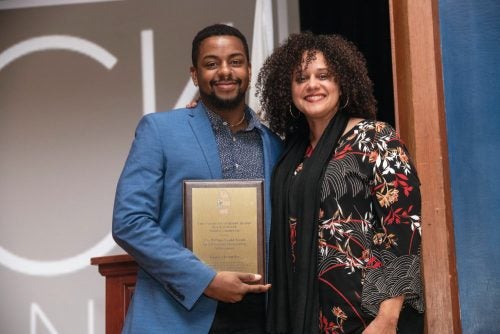Gyasi Alexander inspects a fish during URI’s 2018 Summer Shark Camp for high school students, which he helped coordinate. “The point of the camp wasn’t to create junior scientists, it was exposure,” he says. “In STEM, especially in marine sciences, there’s a huge lack of people of color. It’s good for them to see through hands-on experience that people who look like them can do these types of things.”
Marine biologist Gyasi Alexander feels at home on the ocean. At URI, he learned to feel at home in the STEM disciplines. The Gates Scholar isn’t sure what his next academic step will be, but he knows he’s committed to creating a sense of belonging for underrepresented students in STEM.
As a kid growing up on military bases all over the United States, Gyasi Alexander ’19 connected to his Trinidadian identity through the water. “The most Caribbean thing about me has always been my love of the ocean, and from a young age my family cultivated that in me with movies and books, and by telling me that one day I could go back to Trinidad and see it all for myself,” says Alexander, who immigrated to the states when he was 2 years old.

That passion led him to URI’s College of the Environment and Life Sciences (CELS). He graduated with a B.S. in marine biology last spring and is now considering pursuing a doctorate in the field. Studying the ocean unexpectedly helped him discover another calling, perhaps one with an even stronger pull: uplifting students, like himself, from backgrounds that are underrepresented in STEM, in particular, and on college campuses in general.
Despite Alexander’s academic success—he was awarded a prestigious Gates Millennium Scholarship, which funds up to 10 years of higher education—he says he struggled to find his footing when he first arrived at URI as a transfer student in 2016. “I was kind of in a bad place,” he says. His off-campus housing had fallen through, and he wasn’t aware of the many on-campus resources that were available to him. Alexander’s parents, in Hagerstown, Maryland, hadn’t had traditional college experiences themselves, so “I kind of felt like I had to figure it out for myself,” he says.
Thankfully, he quickly found support from mentors including CELS assistant dean Michelle Fontes ’96, M.A. ’11, and biology professor Bryan Dewsbury. “The biggest thing was that they made me feel entitled to the resources that were here,” Alexander says. “They made me feel that I deserved them and could actually use them.”
But he realized that not all other students who are minorities or the first in their families to attend college receive the help they need, or even know how to access it. Simultaneously, he started thinking more about why there weren’t more students who looked like him in his science labs.
“Diversity is the best thing about life in all its forms. It’s how we create new ideas, and how life keeps going and getting better.”
Wanting to do his part to inspire others, rather than carry “all those chips on my shoulder,” Alexander got involved in projects related to diversity and inclusion. He served as president of Seeds of Success, a student-run organization that helps underrepresented CELS students succeed academically, professionally, and socially, and worked with journalism and film media professor Kendall Moore to produce the documentary film Can We Talk, featuring students of color discussing their sense of belonging in STEM fields.
“A lot of STEM students are very introverted, and you really have to draw out their confidence,” says Fontes. “But there are select students that are outgoing and able to open themselves up. Gyasi was one of those few. He connected with students and was open about his struggles, so he could help them with theirs.”
In that spirit, Alexander is currently finishing production on a podcast, The Hidden Curriculum, featuring interviews with dozens of first-generation college students. He started the project as a fellow in Dewsbury’s lab. “What he’s doing is a bit unique,” Dewsbury says. “He’s not just interviewing people. He’s transcribing the interviews and then connecting parts of the podcast to research on social belonging, stereotyping, and things like that.”
Gyasi Alexander spent last summer in Hawaii doing research on endangered coral reefs. He’s pictured here on a dive to collect colonies for an experiment he worked on as part of his internship with the Gates Lab.
After spending the summer in the Pacific Ocean, doing research on endangered coral reefs as an intern in the Gates Lab, Hawaii Institute of Marine Biology at the University of Hawaii, Alexander returned home to Maryland, where he’s now working as an aquarium maintenance technician and contemplating his next steps academically. He may steer his career toward science communications or continue studying marine biology in a graduate program. Either way, he’ll be thinking about fostering diversity–both in the ocean and on land. “Diversity is the best thing about life in all its forms,” Alexander says. “It’s how we create new ideas, and how life keeps going and getting better.” •
– Jenna Pelletier

THATS MY BROTHER!!!!! MHM PERIOD A SCHOLAR !!!! YOU LOVE 2 SEE IT A YOUNG BLACK MALE TRYING TO MAKE THIS WORLD A BETTER PLACE!!!! I’m so proud of you gyasi 🙂
Gyasi Alexander: The Epitome of Black Excellence in America.